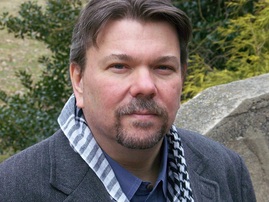
I’m always on the lookout for outstanding crime fiction, especially contemporary stories in the great noir tradition. A few years ago, I discovered the writing of Dennis Tafoya. I started with the gritty and evocative novel, THE WOLVES OF FAIRMOUNT PARK, and realized within a few chapters that I had found a new favorite writer. I raced through his darkly terrific debut, DOPE THIEF, and then devoured stories like “Above the Imperial” (from PHILADELPHIA NOIR) and “Satan’s Kingdom” (from NEEDLE Magazine and just selected for BEST AMERICAN MYSTERY STORIES 2014, edited by Otto Penzler and Laura Lippman).
Now, Dennis Tafoya is back with a brand-new novel, THE POOR BOY’S GAME. In a Starred Review, “Publisher’s Weekly” said: “Tafoya delivers a gut-wrenching crime thriller as gritty and harsh as a Philadelphia winter … Tafoya does a superb job keeping the reader guessing to the surprise end.”
A student of literature, film, and creativity, Dennis is also a thoughtful and insightful teacher. I was fortunate to take a writing class Dennis taught with members of the Philadelphia Liars Club and I really connected with his teaching style and the writing examples he used. Generous and encouraging to fellow writers, he helped me discover Wells Tower and THE FRIENDS OF EDDIE COYLE, and even connected me with one of the editors I used for my own debut novel.
An exquisite writer and an all-around great guy, Dennis Tafoya stops by the blog today for a fascinating discussion about the creative life — and I couldn’t be more thrilled.
Now, Dennis Tafoya is back with a brand-new novel, THE POOR BOY’S GAME. In a Starred Review, “Publisher’s Weekly” said: “Tafoya delivers a gut-wrenching crime thriller as gritty and harsh as a Philadelphia winter … Tafoya does a superb job keeping the reader guessing to the surprise end.”
A student of literature, film, and creativity, Dennis is also a thoughtful and insightful teacher. I was fortunate to take a writing class Dennis taught with members of the Philadelphia Liars Club and I really connected with his teaching style and the writing examples he used. Generous and encouraging to fellow writers, he helped me discover Wells Tower and THE FRIENDS OF EDDIE COYLE, and even connected me with one of the editors I used for my own debut novel.
An exquisite writer and an all-around great guy, Dennis Tafoya stops by the blog today for a fascinating discussion about the creative life — and I couldn’t be more thrilled.
Hey, Dennis, thanks for being here. Tell us, when did you know you wanted to be a writer? When did you know you were one?
I’ve been writing since I was a kid. I started writing horror and science fiction inspired by movies and TV shows and the short stories I loved when I first started reading, by guys like Ray Bradbury and Robert Bloch. There were a lot of monsters, a lot of dinosaurs lurking in remote canyons in the desert. Demons that passed through portals or holes from other dimensions. When you’re a certain kind of kid there’s a lot of cataclysmic stuff in your head trying to get out.
I don’t think I accepted that I was a real writer until I was walking from Penn Station to the Flatiron Building to meet my editor for the first time. Before I had an agent and contract I think writing was something I didn’t let myself consider a serious aspiration. It was a desire I kept hidden for all the reasons we hide things that really matter to us – fear of failure, fear of ridicule for wanting something that seems beyond the normal possibilities of a life defined by work and family and a high school diploma.
What creative work most recently inspired you?
I’m constantly looking for cool stuff to light up the creative parts of my brain. I love poetry and will sit and read the Writer’s Almanac for hours for the daily poems. There’s a poem that I stumbled on in an issue of Poetry by Mary Szybist that I can’t stop thinking about called “On Wanting to Tell [ ] about a Girl Eating Fish Eyes.” I think it’s about the irreducibility of some experiences, like the death in the title. The narrator asks the girl what the eyes taste like, and she says, ‘they taste like eyes.’ Some things aren’t like other things. Death isn’t like anything else. If I knew Mary I’d love to ask her. But even if I’m getting the poem wrong, it’s beautiful and dreamlike and startling, which describes all the stuff I really love and (most importantly) that I can feel myself learning from as I read. From Annie Proulx’s Western stories to Megan Abbott’s The End of Everything or Denis Johnson’s Train Dreams. It’s not just that I love those stories, it’s that their dreamlike quality almost overwhelms the narrative in the way that our obsessive thoughts, our endless attempt to understand our experiences can overwhelm our daily lives and obscure reality.
Have you ever abandoned a creative project?
I start and abandon work constantly, but I don’t think much actually goes to waste. If I’ve come up with anything good I’ll most likely reuse it somewhere else. Also, it can be tough to sort out abandoning from writing…really…slowly, which I also do. If when I die there are a hundred unfinished stories on my hard drive, it might be that I really did intend to go back and finish them. I need a really good idea to write the next thing in a story, and I force myself to work almost exclusively in a linear fashion; I’m not allowed to jump around in a story because I know from experience that I’ll end up with a bunch of scenes that don’t mean anything because they lack connective tissue. A sack of bones instead of a living, breathing thing.
The last film I enjoyed was …
Loved Blue Ruin by Jeremy Saulnier. It’s about violence and retribution, but without any of the self-righteousness or schmaltz of pictures that are usually about those things. The main character is avenging a wrong, but he has no idea what he’s doing, either in the particulars of attacking a violent felon or when trying to concoct a strategy to keep his family safe. The result is certainly horrifying, but also affecting because you can’t help but feel for this mentally-fragile guy who’s so completely out of his depth. Also really intrigued by The Rover and Under the Skin, both of which I think are more about evocative situations and imagery than compelling narrative.
What creative work might we be surprised to find on your shelf, iPod, or TiVo?
I read a lot of true crime, which I guess wouldn’t be surprising, but I also read a lot of military history and have a lot of old books about UFO conspiracies and ‘strange but true’ stuff from the fifties and sixties (including a few great old paperbacks given to me by Wallace Stroby) I have the collected books of Charles Fort and a copy of They Knew Too Much About UFOs by the huckster Gray Barker. I recently tore through The United States of Paranoia, by Jesse Walker, which is a terrifically smart survey of American conspiracy theories going back to the Revolution. There’s a point in the sixties where all these threads of conspiracy-obsession, UFO-obsession and Illuminati-obsession get so tangled that folks like the Discordianists - who consciously promoted conspiracy myths as a kind of cultural performance art - began to believe themselves part of an actual disinformation conspiracy, and leftwing tricksters concocted a spoof of a RAND Corporation analysis that became a staple of rightwing conspiracy mongers who thought the document was real. I’d like to use all of this stuff in a book someday, but I think I’d need help from someone much brighter than I am. Maybe one of my kids will help me sort it all out.
Facebook and Twitter: friend or foe to a creative?
I think using social media is another endeavor that requires the help of smart friends. I really admire people who do it well (the brilliant Megan Abbott comes immediately to mind), but the lure of fascinating nonsense on the web can be a little like alcohol: When does a bracing shot of brandy to steady the nerves become a three-day, Lost Weekend bender? Anyone who’s gone online to check their mail and found themselves hours later looking at pictures of freakishly huge sand crabs or a fox that adopted a pit bull will know what I mean.
The internet is absolutely essential to what I do. I’m way too shy to approach people and get information I need to write, as a rule, so I make tremendous use of online forums, wikis and other sites maintained by people with a passion for esoteric bits of data. And social media as a promotion tool clearly works, when applied correctly and diligently. My friend Don Lafferty is a fantastic resource in this area, and I always feel guilty that I don’t follow his advice more than I do. I think the trick is to get to the useful stuff and get back to work, and I haven’t mastered that yet. So, as with many things, I guess I’d say watch the folks who are doing it right and take some lessons.
In addition to writing, how do you express your creativity?
I love to take photographs. I’m not very good at it, but it’s a lot of fun.
I’ve been writing since I was a kid. I started writing horror and science fiction inspired by movies and TV shows and the short stories I loved when I first started reading, by guys like Ray Bradbury and Robert Bloch. There were a lot of monsters, a lot of dinosaurs lurking in remote canyons in the desert. Demons that passed through portals or holes from other dimensions. When you’re a certain kind of kid there’s a lot of cataclysmic stuff in your head trying to get out.
I don’t think I accepted that I was a real writer until I was walking from Penn Station to the Flatiron Building to meet my editor for the first time. Before I had an agent and contract I think writing was something I didn’t let myself consider a serious aspiration. It was a desire I kept hidden for all the reasons we hide things that really matter to us – fear of failure, fear of ridicule for wanting something that seems beyond the normal possibilities of a life defined by work and family and a high school diploma.
What creative work most recently inspired you?
I’m constantly looking for cool stuff to light up the creative parts of my brain. I love poetry and will sit and read the Writer’s Almanac for hours for the daily poems. There’s a poem that I stumbled on in an issue of Poetry by Mary Szybist that I can’t stop thinking about called “On Wanting to Tell [ ] about a Girl Eating Fish Eyes.” I think it’s about the irreducibility of some experiences, like the death in the title. The narrator asks the girl what the eyes taste like, and she says, ‘they taste like eyes.’ Some things aren’t like other things. Death isn’t like anything else. If I knew Mary I’d love to ask her. But even if I’m getting the poem wrong, it’s beautiful and dreamlike and startling, which describes all the stuff I really love and (most importantly) that I can feel myself learning from as I read. From Annie Proulx’s Western stories to Megan Abbott’s The End of Everything or Denis Johnson’s Train Dreams. It’s not just that I love those stories, it’s that their dreamlike quality almost overwhelms the narrative in the way that our obsessive thoughts, our endless attempt to understand our experiences can overwhelm our daily lives and obscure reality.
Have you ever abandoned a creative project?
I start and abandon work constantly, but I don’t think much actually goes to waste. If I’ve come up with anything good I’ll most likely reuse it somewhere else. Also, it can be tough to sort out abandoning from writing…really…slowly, which I also do. If when I die there are a hundred unfinished stories on my hard drive, it might be that I really did intend to go back and finish them. I need a really good idea to write the next thing in a story, and I force myself to work almost exclusively in a linear fashion; I’m not allowed to jump around in a story because I know from experience that I’ll end up with a bunch of scenes that don’t mean anything because they lack connective tissue. A sack of bones instead of a living, breathing thing.
The last film I enjoyed was …
Loved Blue Ruin by Jeremy Saulnier. It’s about violence and retribution, but without any of the self-righteousness or schmaltz of pictures that are usually about those things. The main character is avenging a wrong, but he has no idea what he’s doing, either in the particulars of attacking a violent felon or when trying to concoct a strategy to keep his family safe. The result is certainly horrifying, but also affecting because you can’t help but feel for this mentally-fragile guy who’s so completely out of his depth. Also really intrigued by The Rover and Under the Skin, both of which I think are more about evocative situations and imagery than compelling narrative.
What creative work might we be surprised to find on your shelf, iPod, or TiVo?
I read a lot of true crime, which I guess wouldn’t be surprising, but I also read a lot of military history and have a lot of old books about UFO conspiracies and ‘strange but true’ stuff from the fifties and sixties (including a few great old paperbacks given to me by Wallace Stroby) I have the collected books of Charles Fort and a copy of They Knew Too Much About UFOs by the huckster Gray Barker. I recently tore through The United States of Paranoia, by Jesse Walker, which is a terrifically smart survey of American conspiracy theories going back to the Revolution. There’s a point in the sixties where all these threads of conspiracy-obsession, UFO-obsession and Illuminati-obsession get so tangled that folks like the Discordianists - who consciously promoted conspiracy myths as a kind of cultural performance art - began to believe themselves part of an actual disinformation conspiracy, and leftwing tricksters concocted a spoof of a RAND Corporation analysis that became a staple of rightwing conspiracy mongers who thought the document was real. I’d like to use all of this stuff in a book someday, but I think I’d need help from someone much brighter than I am. Maybe one of my kids will help me sort it all out.
Facebook and Twitter: friend or foe to a creative?
I think using social media is another endeavor that requires the help of smart friends. I really admire people who do it well (the brilliant Megan Abbott comes immediately to mind), but the lure of fascinating nonsense on the web can be a little like alcohol: When does a bracing shot of brandy to steady the nerves become a three-day, Lost Weekend bender? Anyone who’s gone online to check their mail and found themselves hours later looking at pictures of freakishly huge sand crabs or a fox that adopted a pit bull will know what I mean.
The internet is absolutely essential to what I do. I’m way too shy to approach people and get information I need to write, as a rule, so I make tremendous use of online forums, wikis and other sites maintained by people with a passion for esoteric bits of data. And social media as a promotion tool clearly works, when applied correctly and diligently. My friend Don Lafferty is a fantastic resource in this area, and I always feel guilty that I don’t follow his advice more than I do. I think the trick is to get to the useful stuff and get back to work, and I haven’t mastered that yet. So, as with many things, I guess I’d say watch the folks who are doing it right and take some lessons.
In addition to writing, how do you express your creativity?
I love to take photographs. I’m not very good at it, but it’s a lot of fun.
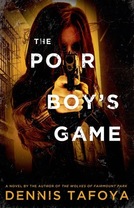
Here in the Philadelphia area, we are proud to call Dennis Tafoya one of our own. But we’re so glad the rest of the world is quickly getting to know him as well. With THE POOR’S BOY GAME, you’ll find Dennis exploring, as he tells us, “family connections and obligations, how much we’re innately ourselves and how much we’re formed by (and in opposition to) the people who raised us.” It’s time to discover the deep and dark literary world of Dennis Tafoya for yourself. You’ll find him on his website, Facebook, twitter, and in bookstores everywhere.
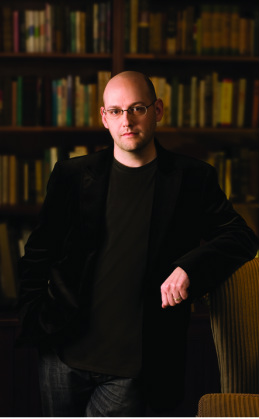
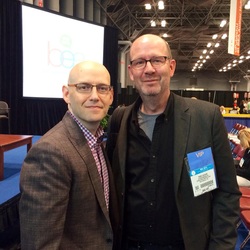
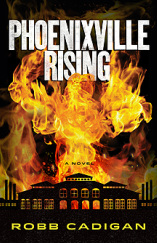

 RSS Feed
RSS Feed
